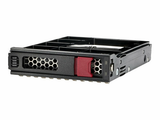Enhancing Performance with HPE SSDs for MSA 1050/1052 and MSA 2050/2052 SAN Storage Systems
In today’s data-driven world, businesses demand faster, more efficient, and reliable storage solutions to manage their increasing data workloads. HPE (Hewlett Packard Enterprise) offers a range of Solid-State Drives (SSDs) that are designed to enhance the performance and efficiency of their Modular Smart Array (MSA) storage systems, particularly the MSA 1050/1052 and MSA 2050/2052 models.
Overview of HPE MSA Storage Systems
The HPE MSA 1050/1052 and MSA 2050/2052 are part of HPE's entry-level SAN (Storage Area Network) storage solutions. These systems are designed for small to medium-sized businesses (SMBs) and remote office/branch office (ROBO) environments that need affordable, yet powerful, storage solutions.
MSA 1050/1052: These models are ideal for SMBs looking to transition from direct-attached storage (DAS) to a more efficient and scalable SAN environment. The MSA 1050/1052 offers basic SAN features at a budget-friendly price point.
MSA 2050/2052: These are more advanced models offering higher performance and capacity. The MSA 2050/2052 are equipped with features such as automated tiering and data migration capabilities, making them suitable for more demanding workloads and applications.
Importance of SSDs in Modern Storage Solutions
Traditional Hard Disk Drives (HDDs) have long been the backbone of storage systems, but they come with limitations, particularly in terms of speed and reliability. SSDs, on the other hand, offer significant advantages:
1. Faster Performance: SSDs are known for their high-speed data transfer rates, resulting in reduced latency and faster access times. This is crucial for applications requiring real-time data processing.
2. Reliability: With no moving parts, SSDs are less prone to mechanical failure, offering higher reliability and durability compared to HDDs.
3. Energy Efficiency: SSDs consume less power, which translates to lower energy costs and a reduced environmental footprint.
4. Enhanced IOPS (Input/Output Operations Per Second): SSDs provide higher IOPS compared to traditional HDDs, which is essential for workloads that demand rapid data processing.
HPE SSDs for MSA 1050/1052 and MSA 2050/2052
HPE offers a range of SSD options for the MSA 1050/1052 and MSA 2050/2052 storage systems, designed to cater to various performance and capacity needs. These SSDs are available in different form factors and capacities to meet the specific requirements of different businesses.
1. Read-Intensive SSDs: These SSDs are optimized for read-heavy workloads, such as database queries, online transactions, and content delivery. They offer a balance between performance and cost, making them ideal for environments where read operations dominate.
2. Mixed-Use SSDs: For environments that require a balance between read and write operations, mixed-use SSDs are the ideal choice. These drives are designed to handle a combination of read and write workloads, making them suitable for general-purpose applications.
3. Write-Intensive SSDs: For workloads that involve frequent write operations, such as data logging, write-intensive SSDs offer the durability and performance needed to sustain high write volumes over time.
4. Capacity SSDs: For organizations with large data storage needs but constrained budgets, capacity SSDs offer a cost-effective solution. They provide larger storage capacities while still delivering the performance benefits of SSD technology.
Benefits of HPE SSDs in MSA Storage Systems
When paired with HPE MSA storage systems, these SSDs unlock several benefits:
1. Improved System Performance: SSDs can dramatically reduce data access times, speeding up applications and reducing latency. This results in improved overall system performance, making it easier for businesses to meet their performance goals.
2. Scalability: HPE SSDs allow businesses to scale their storage capacity and performance as their data needs grow. This flexibility ensures that organizations can continue to expand their storage systems without experiencing performance bottlenecks.
3. Enhanced Data Protection: HPE’s SSDs are equipped with advanced features like wear leveling and error correction, which help protect data integrity and prolong the lifespan of the drives.
4. Lower Total Cost of Ownership (TCO): While SSDs may have a higher upfront cost compared to HDDs, their increased performance, reliability, and energy efficiency contribute to a lower TCO over time. This makes them a smart investment for businesses looking to maximize their storage ROI.
Conclusion
Incorporating HPE SSDs into your MSA 1050/1052 or MSA 2050/2052 storage system can significantly enhance your storage performance, reliability, and efficiency. These SSDs are engineered to handle various workloads, ensuring that businesses of all sizes can find the right storage solution to meet their specific needs. Whether you are looking for improved data access times, greater scalability, or enhanced data protection, HPE’s SSD offerings for MSA storage systems provide a solid foundation for your data management strategy.
Recent Posts
-
Where Legacy Bays Meet Lightning Speed: The HPE 960GB LFF SATA Mixed Use SSD Built for ProLiant Gen9 and Gen10 Servers
Power and Reliability in Enterprise Storage: HPE 960GB LFF SATA Mixed Use SSD for ProLiant Gen9 and …Dec 14th 2025 -
Solid Confidence in Every Byte: Powering ProLiant Gen10 and Gen10 Plus Servers with the HPE 960GB LFF Value SAS SSD
HPE 960GB 3.5-inch LFF Digitally Signed Firmware SAS-12Gbps Mixed Use Value SAS Multi Vendor SSD for …Dec 13th 2025 -
Where Reliability Meets Everyday Speed: Empowering ProLiant Gen9 and Gen10 Servers with the HPE 960GB LFF SATA Mixed Use SSD
HPE 960GB 3.5-inch LFF Digitally Signed Firmware SATA-6Gbps Mixed Use SSD for ProLiant Gen9 and Gen1 …Dec 12th 2025




